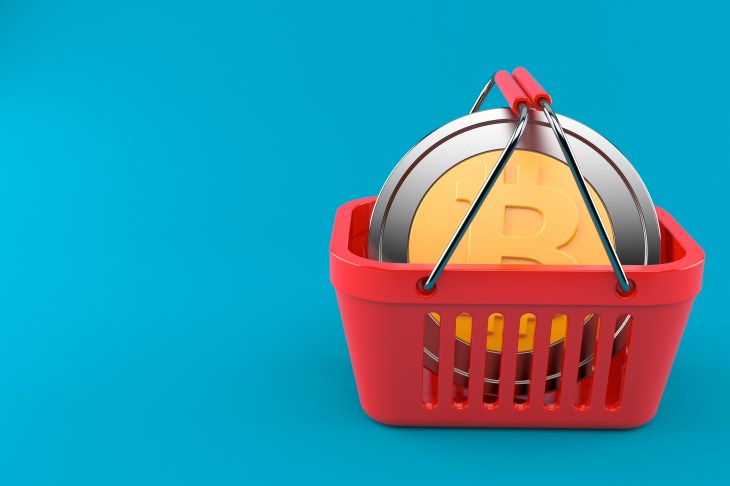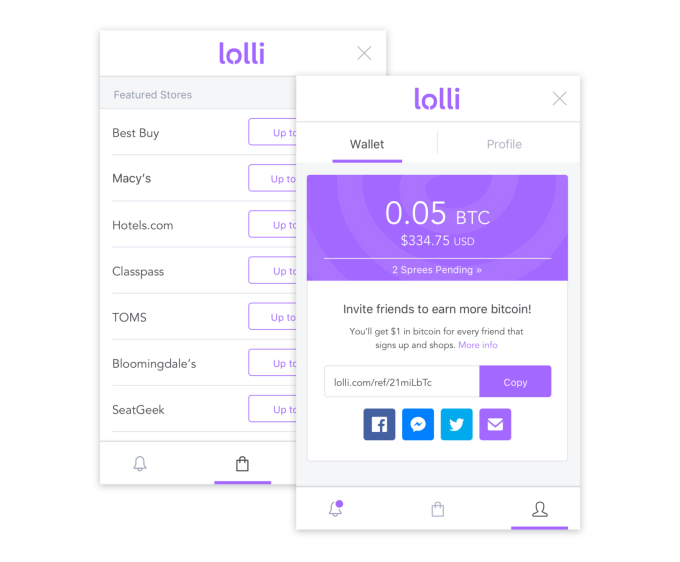Lolli launches to give you free Bitcoin while you shop

Bitcoin has had tremendous success as a cryptocurrency, with millions of people around the world having traded the currency through command lines and wallets like Coinbase. Yet, for all of the excitement in the space, BTC remains largely the province of technically-sophisticated finance and software junkies and their Uber drivers. How can everyone in the world use crypto?
For Alex Adelman, that challenge proved an enigma. Partnering with Matt Senter, he had previously founded Cosmic Cart, a “universal shopping cart” that would allow companies to sell their goods anywhere online. The company was eventually acquired by POPSUGAR, and acquired a second time by Ebates, a Rakuten-owned affiliate marketing platform. Adelman wanted to get into the blockchain world, but didn’t want to leave behind his network in the retail world.
After reconnecting and exploring, Adelman and Senter realized that scaling consumer demand for Bitcoin is the critical challenge for widespread adoption of the technology, and that retail rewards and loyalty could represent a port of entry for consumers new to cryptocurrencies.
Out of that thinking was born Lolli. Lolli is a rewards platform that offers users BTC when they shop at participating online retailers. Consumers install a browser extension or start from Lolli’s website to discover retailers offering crypto rewards (smartphone and tablet apps are “coming soon”). Each retailer sets their own “cashback” (cryptoback?) rate, and that BTC reward is then moved into a Lolli wallet.

Lolli allows users to receive Bitcoin for their online purchases
The company’s name is inspired by the lollipops that Adelman received as a kid when visiting his bank. The dream is to massively expand the number of consumers who have Bitcoin wallets, while also educating them on what cryptocurrency is and how to use it.
What makes Lolli compelling though isn’t the concept — loyalty in the crypto space isn’t particularly unknown nor are airdrops — but rather the deep bench of online retailers that are included right from the startup’s launch. Adelman told me that users can already shop at more than 500 retailers, including Jet, Forever21, Bloomingdales, and ClassPass, avoiding the chicken and egg problem endemic to many rewards startups.
As with all rewards and loyalty programs, there is a two-sided marketplace component that can make these challenging to scale. One interesting dynamic though is that retailers are increasingly looking for ways to engage with cryptocurrencies. Adelman explained to me that the retailers he has been talking to have been surprised at the wide excitement among consumers around crypto and what it means, and they want to use that excitement to engage with potential new customers.

Lolli’s browser extension allows users to find retailers who offer free Bitcoin for purchases
While many retailers have flitted back and forth about whether to accept Bitcoin and other cryptocurrencies as a valid payment method, there is less concern on the rewards side about the volatility of cryptocurrencies. Plus, connecting with consumers around the technology can give retailers an early look into how consumers think about their wallets, and how they might change their online shopping behaviors in the future.
In many ways, Lolli is symmetrical to another recently launched loyalty app called Bumped. Bumped partners with retailers to drive loyalty, but instead of handing out BTC, it hands out free shares (or microshares) of the stock of the company a consumer just shopped at. The idea there, as with Lolli, is that few consumers own stock these days, and rewards and loyalty can be a mechanism to drive shopping behavior while also providing an initial financial portfolio for consumers.
While gross transaction volume and user engagement are valuable themselves, what really drives the valuations of these companies is the wallet or brokerage accounts behind them. Investors highly value these sorts of gateway financial products, which is one reason why Robinhood is valued at $5.6 billion with just more than 4 million accounts. Lolli’s bet is that it can become the de facto wallet for millions of consumers.
Lolli only supports Bitcoin at launch, and Adelman is certainly a strong proponent of the view that Bitcoin is likely the one cryptocurrency to rule them all. With many more consumers potentially getting their first satoshis though, Lollis’ dream, and the dream of many crypto investors, may well have a chance to come to pass.
No comments:
Post a Comment